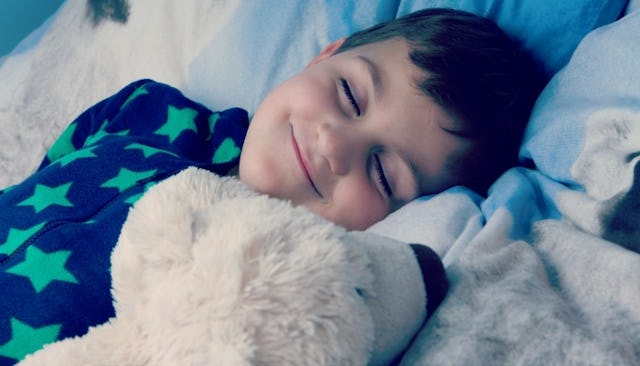A Foolproof Strategy To Keep Your Kids In Their Rooms After Bedtime

We started doing a bedtime routine when my first child was an infant, and we included every step we’d ever heard of: nursing with dim lights, infant massage, a lullaby; then we graduated to a book, a drink of water, prayers; and then, once he was about 3, it got truly absurd: games, songs, 13 prayers, a back scratch, a snuggle. At a certain point, we abandoned the bedtime routine entirely because it meant starting the process at 4 in the afternoon. Now the routine is just tooth-brushing and prayers.
But that doesn’t stop what I call the “second act” of bedtime, which begins the moment you kiss them on the forehead, turn off the light and leave the room. I usually stand in the hallway and count down to myself: “Five, four, three, two, one…” just as “Mom!” erupts from the kids’ room.
“I need a drink of water,” says my 5-year-old son.
“It’s right by your bed,” I tell him. I kiss him again and go into the kitchen and start the dishes.
Pad, pad, pad, go little feet in the hallway. “Mom, I need to go to the bathroom,” he says, and I say OK, and off he goes. And then back into his room. I continue the dishes. I hear a creak on the hall floor.
“What?” I say sharply, without turning around, because I’m starting to get a little irritable.
“The fan is blowing on my feet,” he says, so I go back into their room (the toddler, still imprisoned in a crib, watches this all with interest) and cover his feet with a sheet, but not the blanket, because that will be too hot, and not pulled up past his feet, because then he’ll get tangled.
OK? OK. Kiss. Goodnight. Back to the dishes. All’s quiet for half an hour, and I’m happily reading and stuffing my face with cookies when a little face suddenly looms over the side of the armchair, startling the crap out of me.
“I forgot something I wanted to tell you,” he says, and I say “What?” and he pauses, clearly surprised that this gambit worked. “Um,” he says, trying to think of something.
“Buddy,” I say (sometimes calmly and sometimes with a major edge, verging on yelling), “GET BACK INTO BED.”
And sometimes that’s the end of it, and sometimes it isn’t. On bad nights, the yo-yoing can go on for a full two hours.
What if there’s a solution? Well, there might be: the “sleep pass,” akin to a hall pass, for kids who keep bouncing out of bed and driving their parents bonkers and depriving themselves of much-needed rest. NPR reported on the research of Dr. Connie Schnoes, the director of National Behavioral Health Dissemination at the Boys Town Center for Behavioral Health in Boys Town, Nebraska.
Dr. Schnoes designed a study for two children that used a “pass”—a 5-by-7-inch card that was their one get-out-bed-free card. The kids could use the pass once per bedtime as necessary to use the bathroom, get a drink of water, ask for a cuddle, whatever. Once they used it, the kids weren’t allowed to get out of bed again, and the parents didn’t go to them if they cried out. Dr. Schnoes reported that the pass reduced the crying and coming out of the bedroom to zero. The study has been duplicated with larger groups of children. The parents report that the pass system significantly reduces that bedtime “second act.”
NPR reports: “The beauty of the pass is that it gives parents and kids an element of control in what frequently is an out-of-control, emotional situation. The kids know that if they truly need to leave their room they can, but only once. And the parents know they are giving their child an option, but after that one exit they can in good conscience keep the door closed.”
I am trying this tonight. If it reduces the bedtime boomerang, I’m all for it. The pass isn’t just for my comfort, even though I do hope it will stop the irritating back-and-forth that eats up an hour or more of every evening. My son needs more sleep than he’s getting, and lying in bed deliberating whether or not to use the hall pass might just be boring enough to, hopefully, help him fall asleep.
This article was originally published on